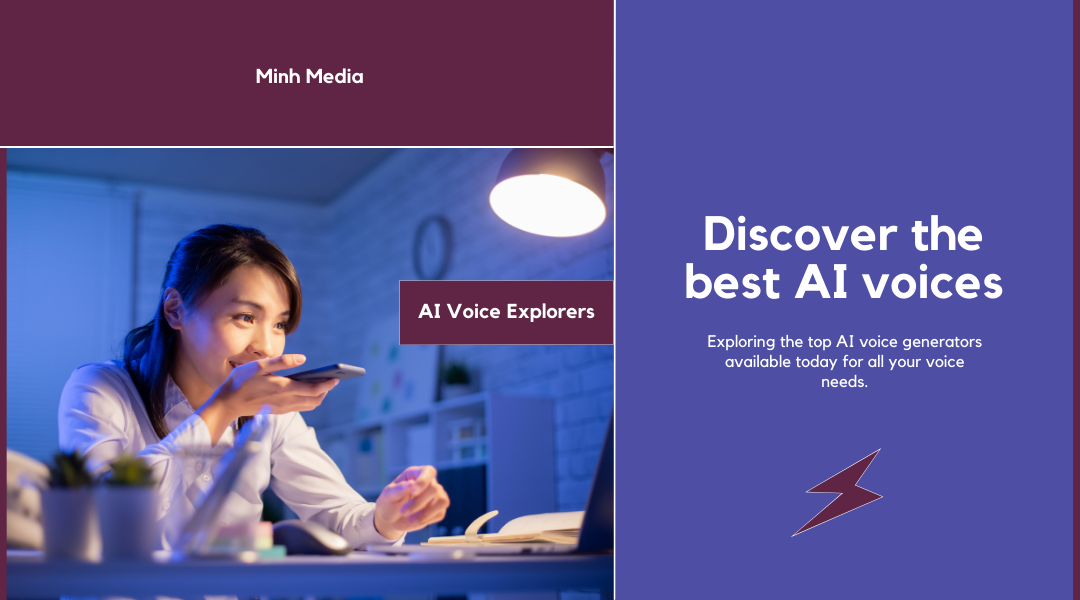The Rise of AI Voice Generators: Why they’re transforming content creation, accessibility, and more The world of content creation and communication is undergoing a remarkable transformation, thanks to the rapid advancements in artificial intelligence (AI) voice generation technology. AI voice generators have emerged as a game-changing solution, offering an array of benefits that are revolutionizing various industries, from marketing and education to accessibility and beyond.
What Are AI Voice Generators?: Definition, brief technical explanation, and use cases AI voice generators are software applications that utilize machine learning algorithms to create human-like speech from written text. These advanced technologies rely on natural language processing (NLP) and text-to-speech (TTS) capabilities to generate realistic-sounding audio that can mimic different voices, accents, and emotional expressions. The applications of AI voice generators are vast, spanning from content creation and voiceovers to accessibility solutions and personalized communication.
Key Benefits: Cost-effectiveness, time savings, versatility, accessibility, scalability, efficiency The rise of AI voice generators has unlocked a world of possibilities for content creators, businesses, and individuals alike. These powerful tools offer a range of benefits that are reshaping the way we approach various tasks and challenges:
- Cost-Effectiveness: AI voice generators provide a cost-effective alternative to traditional voice recording and professional voiceover services, making high-quality audio content more accessible to a wider audience.
- Time Savings: Generating audio content with AI voice generators can be significantly faster than manual voice recording, allowing for quicker turnaround times and increased productivity.
- Versatility: AI voice generators offer a wide range of voice options, catering to diverse preferences and use cases, from formal narration to expressive character voices.
- Accessibility: These tools can greatly improve accessibility for individuals with disabilities or language barriers, by providing text-to-speech functionality and multilingual support.
- Scalability: AI voice generators can easily scale to meet the needs of growing businesses or content creation projects, without the limitations of human resources.
- Efficiency: The automation and customization capabilities of AI voice generators streamline the audio content creation process, enabling greater efficiency and optimization.
Target Audience: Content creators, educators, marketers, podcasters, businesses, individuals AI voice generators cater to a diverse range of users, each with their own unique needs and goals. This expansive target audience includes:
- Content Creators: Bloggers, YouTubers, podcasters, and other creators who require high-quality voiceovers for their content.
- Educators: Teachers, instructors, and educational institutions that need accessible, multilingual audio resources for their students.
- Marketers: Businesses and marketing professionals who leverage AI-generated voiceovers for promotional videos, advertisements, and audio content.
- Podcasters: Individuals and organizations producing podcasts, who can use AI voices to enhance their audio content or create new episodes more efficiently.
- Businesses: Companies across various industries, from e-commerce to customer service, that can integrate AI voice generators into their operations to improve efficiency and customer experience.
- Individuals: People with diverse needs, such as those with disabilities, language barriers, or a desire to create personalized audio messages or audio books.
Types of AI Voice Generators
Text-to-Speech (TTS) Engines: Converting written text into spoken words At the core of AI voice generation are text-to-speech (TTS) engines, which are responsible for converting written text into spoken words. These TTS engines leverage advanced natural language processing and machine learning algorithms to analyze the input text and generate human-like speech.
The key factors to consider when evaluating TTS engines include:
- Naturalness: The ability of the generated voice to sound natural and human-like, without sounding overly robotic or synthesized.
- Language Variety: The range of languages and accents supported by the TTS engine, catering to diverse audience needs.
- Customization Options: The level of control and customization available for factors like speech rate, pitch, emphasis, and voice styles (e.g., newscaster, conversational).
Voice Cloning and Voice Synthesis: Replicating or creating unique voices Beyond traditional TTS engines, AI voice generators have also advanced into the realms of voice cloning and voice synthesis. These technologies allow for the replication or creation of unique, personalized voices, offering new possibilities for various applications.
Voice cloning involves the process of replicating an existing voice, often that of a professional voice actor or public figure. This technology can be useful for applications such as audiobook narration, voiceovers, and even virtual assistants, where a consistent, recognizable voice is desired.
Voice synthesis, on the other hand, enables the creation of entirely new, customized voices. This technology is particularly useful for generating unique character voices, emotional expressions, and accents that can enhance storytelling, gaming, and other creative endeavors.
When exploring voice cloning and synthesis technologies, it’s crucial to consider the ethical implications and ensure responsible use, as these advancements can potentially be misused for nefarious purposes, such as creating deepfakes.
AI Voiceovers for Video: Integrating AI voices into video content The integration of AI-generated voiceovers into video content is another emerging application of this technology. By seamlessly blending AI-powered voices with visual elements, content creators can enhance the overall user experience, improve accessibility, and streamline the video production process.
Key considerations for AI voiceovers in video include:
- Lip-Syncing: Ensuring the AI-generated voice is accurately synchronized with the on-screen visuals for a natural, immersive experience.
- Emotional Range: Incorporating the appropriate tone, inflection, and emotional expression to match the context and narrative of the video content.
- Character Development: Leveraging AI voices to create distinct, recognizable characters that contribute to storytelling and brand identity.
- Integration with Video Editing Tools: Seamless integration with popular video editing software to simplify the audio-visual content creation workflow.
In-Depth Review of Leading AI Voice Generators
Murf AI
Overview: Murf AI is a user-friendly AI voice generator that offers a diverse range of natural-sounding voices, studio-quality audio, and a comprehensive suite of voice editing tools. The platform caters to a wide variety of use cases, from content creation and marketing to education and customer service.
Pros and Cons:
| Pros | Cons |
|---|---|
| Easy to use with an intuitive interface | Limited free plan options |
| Diverse range of high-quality voices | |
| Extensive voice customization capabilities | |
| Integrated sound effects and music library |
Ideal for: Beginners, content creators, educators, marketers
Murf AI pricing:
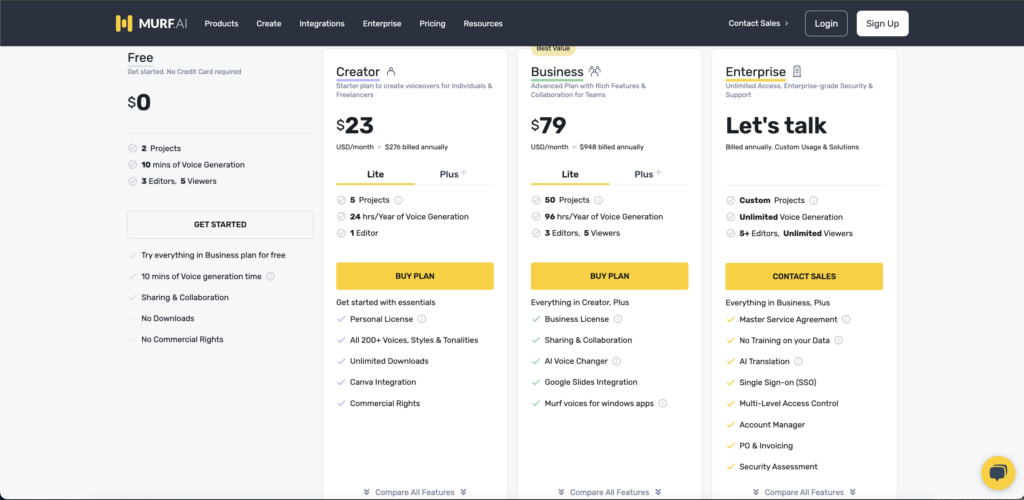
Play.ht
Overview: Play.ht is an AI voice generator that places a strong emphasis on ultra-realistic and expressive voices. The platform boasts an extensive library of natural-sounding voices across multiple languages, making it a popular choice for professional-grade voiceovers, audiobook narration, and podcast production.
Pros and Cons:
| Pros | Cons |
|---|---|
| Highly natural and expressive voices | Higher price point compared to some alternatives |
| Customizable voice options | |
| Multilingual support |
Ideal for: Podcasters, audiobook creators, businesses needing professional voiceovers
Play.ht pricing:
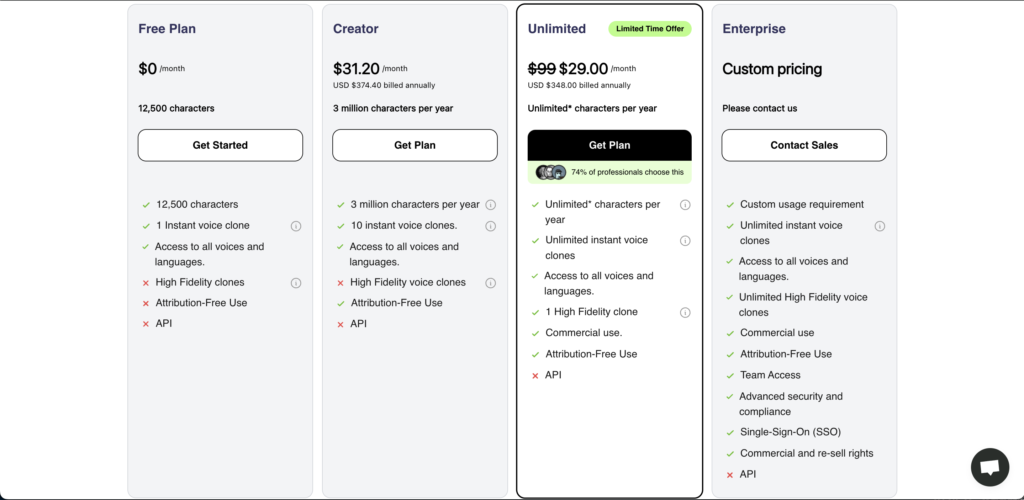
Listnr AI
Overview: Listnr is a streamlined AI voice generator focused on transforming written content into engaging audio formats. The platform excels at converting articles, blog posts, and other text-based materials into high-quality audio, making it an attractive option for publishers, bloggers, and content creators looking to repurpose their content.
Pros and Cons:
| Pros | Cons |
|---|---|
| Straightforward user experience | Limited voice options and customization |
| Efficient for content-to-audio conversion | |
| Podcast creation and distribution capabilities |
Ideal for: Bloggers, publishers looking to convert articles into audio formats or create podcasts
Listnr AI pricing:

Lovo AI
Overview: Lovo AI is a unique AI voice generator that specializes in creating engaging, expressive, and character-driven voices. The platform is particularly well-suited for creative projects, such as audiobook narration, gaming, and storytelling, where the ability to generate distinct, emotive voices is crucial.
Pros and Cons:
| Pros | Cons |
|---|---|
| Extensive library of unique and expressive voices | Less suitable for formal or professional voiceovers |
| Customization options for emotions, accents, and character development |
Ideal for: Game developers, audiobook narrators, creative projects
Lovo AI pricing:
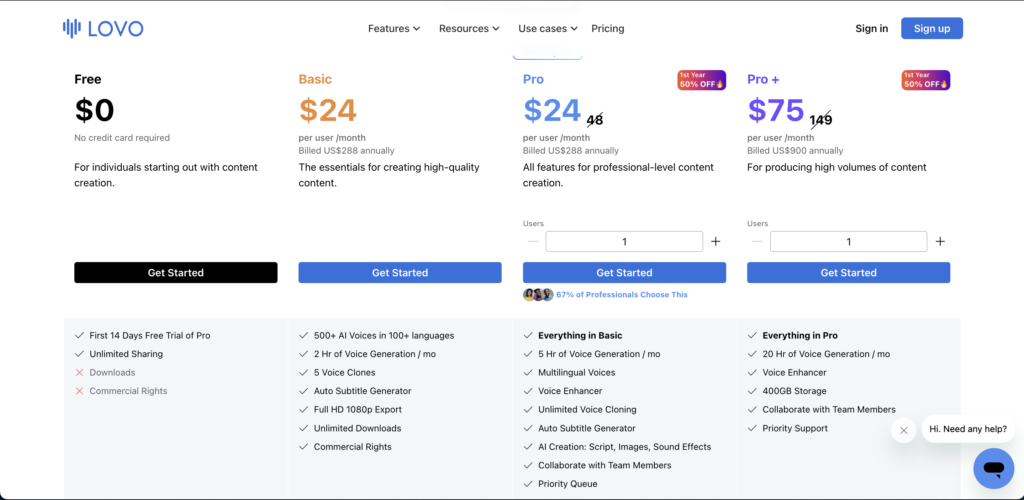
Speechify
Overview: Speechify is a versatile AI voice generator that primarily functions as a text-to-speech reader, with a focus on accessibility and assistive technology features. While not primarily designed for professional voiceovers, Speechify offers a range of customizable voices and integrations that make it a valuable tool for individuals with reading difficulties, students, and productivity-oriented users.
Pros and Cons:
| Pros | Cons |
|---|---|
| Excellent for accessibility and reading assistance | Not as suitable for professional-grade voiceovers |
| Multilingual support | |
| Customizable voice options |
Ideal for: Individuals with reading difficulties, students, productivity users
Speechify Price

ElevenLabs Prime Voice AI
Overview: ElevenLabs Prime Voice AI represents the cutting edge of AI voice generation, offering highly realistic and customizable voice cloning and synthesis capabilities. This advanced platform is primarily aimed at high-end users, such as filmmakers, voice actors, and businesses seeking to create unique, branded voices.
Pros and Cons:
| Pros | Cons |
|---|---|
| Extremely natural and realistic voices | Expensive subscription model |
| Extensive customization options | Careful ethical considerations required |
| Multilingual support |
Ideal for: Filmmakers, high-budget productions, voice actor replacements (with ethical considerations), voice branding
ElevenLabs Price
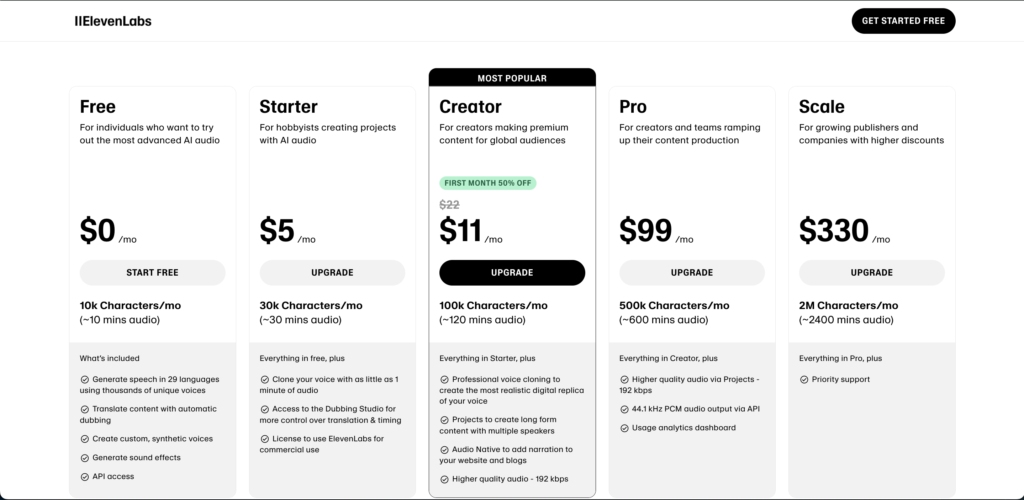
Comparison Table
| Feature | Murf AI | Play.ht | Listnr | Lovo AI | Speechify | ElevenLabs |
|---|---|---|---|---|---|---|
| Ease of Use | 5 | 4 | 4 | 3 | 5 | 3 |
| Voice Quality | 4 | 5 | 3 | 5 | 3 | 5 |
| Customization Options | 4 | 5 | 2 | 5 | 3 | 5 |
| Pricing | $ | $$ | $ | $$ | $ | $$$ |
| Specialties | Versatility | Podcasting, Realism | Articles, Podcasting | Characters, Expressiveness | Accessibility | Realism, Cloning |
| Use Cases | Marketing, Education, Content Creation | Audiobooks, Podcasting, Narration | Blog Posts, Articles | Audiobooks, Games | Reading, Learning | Film, Voice Branding |
Choosing the Right AI Voice Generator for Your Needs
Questions to Ask Yourself:
- What is my budget?
- What type of content am I creating?
- What kind of voice am I looking for (realistic, characterful, specific accent)?
- How much control do I need over customization?
- What is my level of technical expertise?
Recommendations based on use cases (detailed in comparison table):
- Murf AI: Ideal for beginners, content creators, educators, and marketers who require a user-friendly, versatile, and affordable AI voice generator.
- Play.ht: Recommended for podcasters, audiobook creators, and businesses in need of high-quality, professional-grade voiceovers.
- Listnr: Suitable for bloggers and publishers looking to efficiently convert written content into engaging audio formats, such as articles and podcasts.
- Lovo AI: Well-suited for game developers, audiobook narrators, and creators working on projects that require unique, expressive, and character-driven voices.
- Speechify: Beneficial for individuals with reading difficulties, students, and productivity-oriented users who require accessible, customizable text-to-speech functionality.
- ElevenLabs Prime Voice AI: Ideal for filmmakers, high-budget productions, and businesses seeking to create highly realistic, customized voices for voice branding or replacement of voice actors (with ethical considerations).
User Experience and Performance : Murf AI,Play.ht, Listnr,Lovo AI,Speechify,ElevenLabs
Murf AI
- User Experience: Murf AI boasts an incredibly intuitive and user-friendly interface, making it a great choice for beginners and those without technical expertise. The drag-and-drop editor simplifies the process of creating and editing voiceovers.
- Performance: Murf AI offers a wide range of high-quality voices with natural-sounding intonations and expressions. The platform’s text-to-speech engine is quite accurate and can handle different languages and accents. The voice customization options are also impressive, allowing you to fine-tune the pitch, speed, and emphasis of the voice.
Play.ht
- User Experience: Play.ht has a clean and straightforward interface that is easy to navigate. It offers a seamless experience for creating and downloading voiceovers, making it suitable for users of all levels.
- Performance: Play.ht is known for its ultra-realistic voices that rival human voice actors. It offers a wide array of voices with different styles and accents, and the text-to-speech engine is highly accurate. It’s particularly well-suited for long-form content like audiobooks and podcasts.
Listnr
- User Experience: Listnr is designed for simplicity and efficiency. It’s focused on converting articles and blog posts into audio, making it a great choice for content creators who want to repurpose their written content.
- Performance: Listnr offers a decent selection of voices, but the quality and customization options might not be as extensive as some other platforms. However, it excels at generating natural-sounding voiceovers from articles and blog posts, making it ideal for its niche purpose.
Lovo AI
- User Experience: Lovo AI has a slightly steeper learning curve than some other platforms, but it offers a powerful set of features for creating expressive and characterful voices. The interface is well-organized and provides ample customization options.
- Performance: Lovo AI is a standout for creating unique character voices with emotional range and accents. Its extensive library of voices and customization options make it ideal for storytelling, audiobooks, and game development.
Speechify
- User Experience: Speechify is primarily designed as a text-to-speech reader for accessibility purposes. It has a simple and straightforward interface, making it easy for users to listen to articles, documents, or web pages.
- Performance: Speechify’s voice quality is decent, and it offers several customization options for speed and voice selection. However, it’s not the best choice for professional voiceovers as the voices may lack the naturalness and expressiveness of other platforms.
ElevenLabs Prime Voice AI
- User Experience: ElevenLabs Prime Voice AI is geared towards professionals who require high-quality voice synthesis and cloning. While it offers a robust set of features, the interface might be slightly more complex for beginners.
- Performance: ElevenLabs Prime Voice AI stands out for its incredibly realistic voices and advanced voice cloning capabilities. It offers a wide range of voices and extensive customization options, making it suitable for high-budget productions and projects that require lifelike voiceovers.
Comparison Table
| Feature | Murf AI | Play.ht | Listnr | Lovo AI | Speechify | ElevenLabs |
|---|---|---|---|---|---|---|
| Ease of Use | 5 | 4 | 4 | 3 | 5 | 3 |
| Voice Quality | 4 | 5 | 3 | 5 | 3 | 5 |
| Customization | 4 | 5 | 2 | 5 | 3 | 5 |
| Unique Features | Voice editing tools, music & sound effects | Ultra-realistic voices, podcast-specific features | Article-to-audio conversion, podcast creation | Expressive voice styles, character voices | Accessibility features, multilingual | Voice cloning, advanced customization |
| Ideal For | Beginners, content creators, educators, marketers | Podcasting, audiobooks, professional narration | Bloggers, publishers | Audiobooks, games, creative projects | Reading, learning, accessibility | Film, voice branding, high-budget productions |
Methodology: Evaluating Top AI Voice Generators
1. Identifying Key Evaluation Criteria
- Ease of Use: How intuitive is the interface? Can beginners get started quickly? Are tutorials and support readily available?
- Voice Quality and Naturalness: How realistic and expressive are the generated voices? Do they sound robotic or natural? Are different accents and tones available?
- Customization Options: How much control does the user have over voice parameters (pitch, speed, emphasis)? Can users upload their own scripts or use pre-written templates?
- Language and Accent Variety: How many languages and accents are supported? Does the platform cater to a global audience?
- Pricing: What are the different pricing tiers? Does the platform offer a free trial or a free plan? What features are included in each plan?
- Use Cases: What are the primary use cases for the platform? Is it better suited for specific purposes like podcasts, audiobooks, marketing videos, or accessibility tools?
- Unique Features: Does the platform offer any standout features like voice cloning, emotional range, or real-time voice conversion?
- Customer Support: How responsive and helpful is the customer support team? Are there resources like FAQs and tutorials available?
2. Selecting the AI Voice Generators
- Utilize Reputable Sources: The platforms listed in the provided articles (Zapier, Audiocipher, Descript) are a good starting point.
- Consider User Reviews and Ratings: Check online reviews and ratings to get feedback from other users.
- Identify Emerging Players: Explore newer platforms that might not be listed in older articles.
3. Hands-On Testing and Evaluation
- Sign Up for Free Trials: Most platforms offer free trials or limited free plans. Take advantage of these to test the platform’s features.
- Create Sample Audio: Generate voiceovers using different voices and settings. Evaluate the output quality and customization options.
- Explore Unique Features: Test out any unique features the platform offers, such as voice cloning or emotional range.
- Assess Usability: Evaluate how easy it is to navigate the platform, create audio, and access customer support.
4. Comparing and Ranking
- Create a Comparison Table: Use the evaluation criteria to create a table comparing the different platforms side-by-side.
- Weight Criteria: Assign weights to each criterion based on its importance to your specific needs.
- Score Each Platform: Rate each platform on a scale (e.g., 1-5) for each criterion.
- Calculate Overall Score: Multiply the score for each criterion by its weight, and then sum the scores for each platform.
- Rank the Platforms: Based on the overall scores, rank the platforms from highest to lowest.
5. Additional Considerations
- Ethical Considerations: When evaluating voice cloning technology, consider the ethical implications and potential for misuse.
- Future-Proofing: Choose a platform that is likely to remain updated and competitive in the rapidly evolving AI landscape.
Note: This methodology is a framework that can be adapted and customized to your specific needs and priorities. The weights assigned to each criterion and the specific platforms you choose to evaluate may vary.
Ethical Considerations and the Future of AI Voices
Deepfake Concerns: The potential for misuse of realistic AI voices As AI voice generation technology continues to advance, there is a growing concern about the potential for misuse and the creation of deepfakes. Deepfakes are synthetic media in which a person’s voice or image is manipulated to make it appear as if they said or did something they did not. This technology could be used to create false or misleading content, impersonating real individuals for malicious purposes.
Responsible AI Use: Guidelines for ethical voice generation To address these ethical concerns, it is crucial that AI voice generator providers and users adopt a responsible approach to the development and deployment of this technology. This includes:
- Implementing robust safeguards and transparency measures to prevent the misuse of AI voices
- Establishing clear guidelines and policies to ensure AI voices are used for legitimate and ethical purposes
- Educating users on the responsible use of AI voice technology and the potential risks of deepfakes
- Collaborating with regulatory bodies and industry organizations to develop industry-wide standards and best practices
The Future: Advancements in voice technology, implications for various industries As AI voice generation technology continues to evolve, we can expect to see further advancements in areas such as:
- Increased realism and expressiveness of generated voices
- Expanded multilingual capabilities and language support
- Seamless integration with various communication and content creation platforms
- Personalization and voice customization to match individual preferences
- Enhanced accessibility features for individuals with disabilities or language barriers
- Innovative applications in fields like customer service, virtual assistance, and interactive entertainment
These advancements will have far-reaching implications across numerous industries, from entertainment and education to healthcare and customer experience. As AI voice generators become more sophisticated and widely adopted, they will continue to transform the way we create, consume, and interact with content and services.
Conclusion
AI voice generators have emerged as a transformative technology, revolutionizing the way we approach content creation, accessibility, and communication. By offering a range of benefits, including cost-effectiveness, time savings, versatility, and accessibility, these tools are empowering a diverse array of users, from content creators and marketers to educators and businesses.
As you navigate the rapidly evolving landscape of AI voice generators, it’s crucial to carefully evaluate your specific needs, budget, and desired voice characteristics to determine the best solution for your use case. Whether you’re looking to enhance your video content, create engaging audiobooks, or improve accessibility for your audience, there is an AI voice generator that can help you achieve your goals.
As you explore the options presented in this comprehensive guide, remember to consider the ethical implications of this technology and ensure responsible use. With the right AI voice generator and a commitment to ethical practices, you can unlock a world of possibilities and create content that is both impactful and authentic.
Nowadays, with the advancement of computer science and technology and the development of AI in drawing and creating AI images and AI videos. You can continue reading here.

